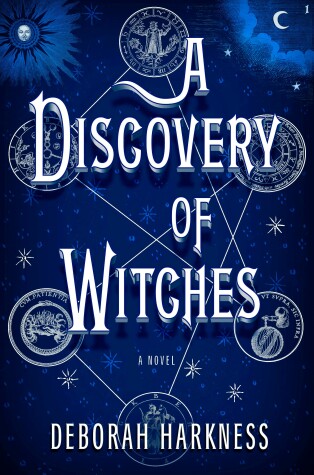Reviewed by celinenyx on
The beginning of the book made me incredibly excited. Not only is the main character a witch (yay!), she's also a historian (yay!!) doing actual historian things. Add to that the Oxford setting, which has always appealed to me ever since I read The Golden Compass as a kid, I felt this was going to be a winner. The first third of the book is thrilling as the world and its players slowly unfolds.
However, most of the tension that is built up in the first part ebbs away in the middle. This is where the fresh fantasy thriller gets thrown overboard, and The Discovery of Witches becomes paranormal romance - of the Twilight persuasion. I have never made it a secret that in general I do not care much for romance, and especially not that what is considered to be romantic in Discovery. After some initial annoyance, Diana falls for the vampire Matthew. He is tall, dark, and handsome; and as possessive as they come. He is territorial, bossy, and crazy protective. He invades Diana's privacy, follows her around. Once they become lovers, he gives her orders (of course, for her own protection). What I found even more problematic is that he inserts himself into any interaction Diana has with other people - including her own family. He scares her, pushes her even when she says she's had enough. He limits her, tells her what she can and cannot do.
And for the life of me, I cannot find this romantic.
I cannot appreciate a partnership where both are not equal. I don't care about their strength or powers - I don't care who can best the other in a fight. I care about the living atmosphere people create. And the one created by Matthew and Diana is toxic.
It is hidden very much in the background, but there are some ideas about masculinity and femininity in this novel that I find problematic. Women are consistently described as being small, petite, doll-like. They are enfolded by men, towered over, protected and held. The men, in contrast, are all tall, warrior-like, testosterone-fuelled and often aggressive. In the entirety of the book, not a single man has ever done a dish or completed a household chore - while the women are constantly cooking, cleaning, and fulfilling other household duties. Even an ancient powerful vampire woman, living in a castle, apparently enjoys being a housekeeper? The men fight, the women oooh and aaah. Diana is systematically excluded from any decision-making, as she usually only has a fraction of the information Matthew has. Though she has magic of her own, it is only drawn out from her when it can assist him in any way.
In A Discovery of Witches, it seems, women exist only in relation to men.
Interestingly, it also contains a lesbian couple - but characterisation at this point fails in making the two only women not belonging to men into individuals. Sarah and Em are practically interchangeable, and though they are Diana's only contacts that she has not met through Matthew, there are few moments of emotional closeness with Diana.
Overall, I feel disappointed. The book seemed so full of promise: a cool historian/witch main character getting tangled up with supernatural beasties. It should come as no surprise that even though Diana is supposed to work at a top university, Yale, she spares not a single thought for her job, her boss, her career, the moment she falls down the rabbit hole with Matthew.
Why can't I ever have a female main character that lives her life for herself?
Reading updates
- Started reading
- 4 June, 2017: Finished reading
- 4 June, 2017: Reviewed
